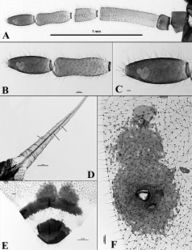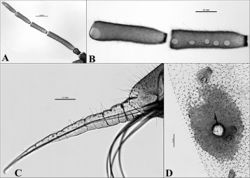Stomaphis graffii
| Notice: | This page is derived from the original publication listed below, whose author(s) should always be credited. Further contributors may edit and improve the content of this page and, consequently, need to be credited as well (see page history). Any assessment of factual correctness requires a careful review of the original article as well as of subsequent contributions.
If you are uncertain whether your planned contribution is correct or not, we suggest that you use the associated discussion page instead of editing the page directly. This page should be cited as follows (rationale):
Citation formats to copy and paste
BibTeX: @article{Łukasz2014DeutscheEntomologischeZeitschrift61, RIS/ Endnote: TY - JOUR Wikipedia/ Citizendium: <ref name="Łukasz2014Deutsche Entomologische Zeitschrift61">{{Citation See also the citation download page at the journal. |
Ordo: Hemiptera
Familia: Aphididae
Genus: Stomaphis
Name
Stomaphis graffii Łukasz & Kanturski, 2014 – Wikispecies link – Pensoft Profile
Description:
Body large, oval. Head distinctly sclerotised, dark. Antennae pale, but with apices of segments (especially V and VI) darker, densely covered with short setae (Fig. 2a). Prothorax dark. Legs dark, with only middle of tibiae slightly paler at the ventral margin. Head covered with short setae. Epicranial suture well developed. Eyes small, with triommatidia not well separated. Antennae 0.31 – 0.34 times body length. Antennal segments IV and VI shorter than ant. segm. V, which is slightly thinner in the middle of its length (Fig. 2b). Antennal ratios: ant. segm. III / segm. IV+V+VI 0.65 – 0.67; segm. III / segm. IV 2.44 – 2.87; segm. IV / segm. V 0.56 – 0.67; segm. V / segm. VI 1.17 – 1.32; segm. VI base / segm. VI terminal process 3.12 – 4.16. Secondary rhinaria of unequal diameter on ant. segm. III and segm. IV. Accessory rhinaria on ant. segm. VI diffused on the base of segment. Terminal process slightly longer than the diameter of primary rhinarium, with nodose protuberances at the apex (Fig. 2c). Rostrum longer than body. Labrum covered with 6-14 setae (Fig. 2d). ARS 1.41 – 1.60 times HT II and 2.14 – 2.56 ant. segm. VI terminal process, with numerous accessory setae. Prothorax with spinal and marginal sclerotizations. Meso- and metathorax with marginal sclerites only. Mesothoracic furca small, well separated. Metathoracic furca reduced, only in form of small, distinctly sclerotised protuberances. Legs covered by long setae, as long as the diameter of tibia in the middle. HT II 1.30 – 1.36 times MT II; ant. segm. IV / HT II 0.51 – 0.67;
Abdomen membranous, covered with fine, long setae, with three rows of dark, intersegmental insertions. Spiracles on very small, pigmented scleroites. Siphuncular pores on distinct, sclerotised cones. Anterior part of the cone always extended and paler (Fig. 2f, unlike in apterous viviparous female – Fig. 4d). Weak, paired spinal sclerites, always broken into a few small scleroites, sometimes present on abdominal tergite VII. Abdominal tergite VIII distinctly and uniformly sclerotised, covered with a few rows of long setae in the posterior margin of the tergite. Subgenital plate separated into two big sclerites, covered with long setae. Cauda rounded, sclerotised, covered with many long setae (Fig. 2e).
Diagnosis:
From the apterous viviparous female it may be distinguished by (fundatrix vs apterous viviparous female): higher ratio of ant. segm. III to ant. segm. IV: 2.44 – 2.87 vs 1.55 – 2.46 lower ratio of ant. segm. IV to ant. segm. V: 0.56 – 0.67 vs 0.76 – 1.16 lower ratio of ant. segm. IV to HT II: 0.52 – 0.67 vs 0.69 – 0.92
Taxon Treatment
- Łukasz, D; Kanturski, M; 2014: Description of hitherto unknown fundatrices of Stomaphis graffii and S. longirostris (Hemiptera, Aphididae, Lachninae) Deutsche Entomologische Zeitschrift, 61(1): 31-36. doi
Images
|

